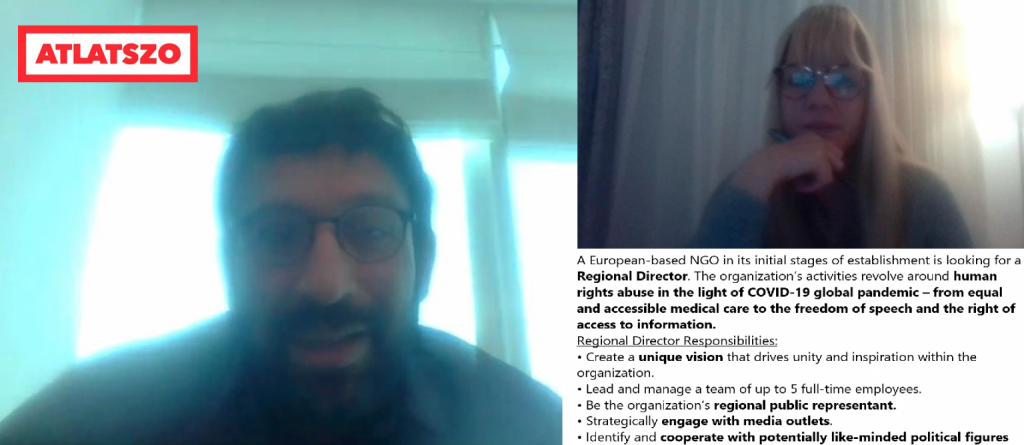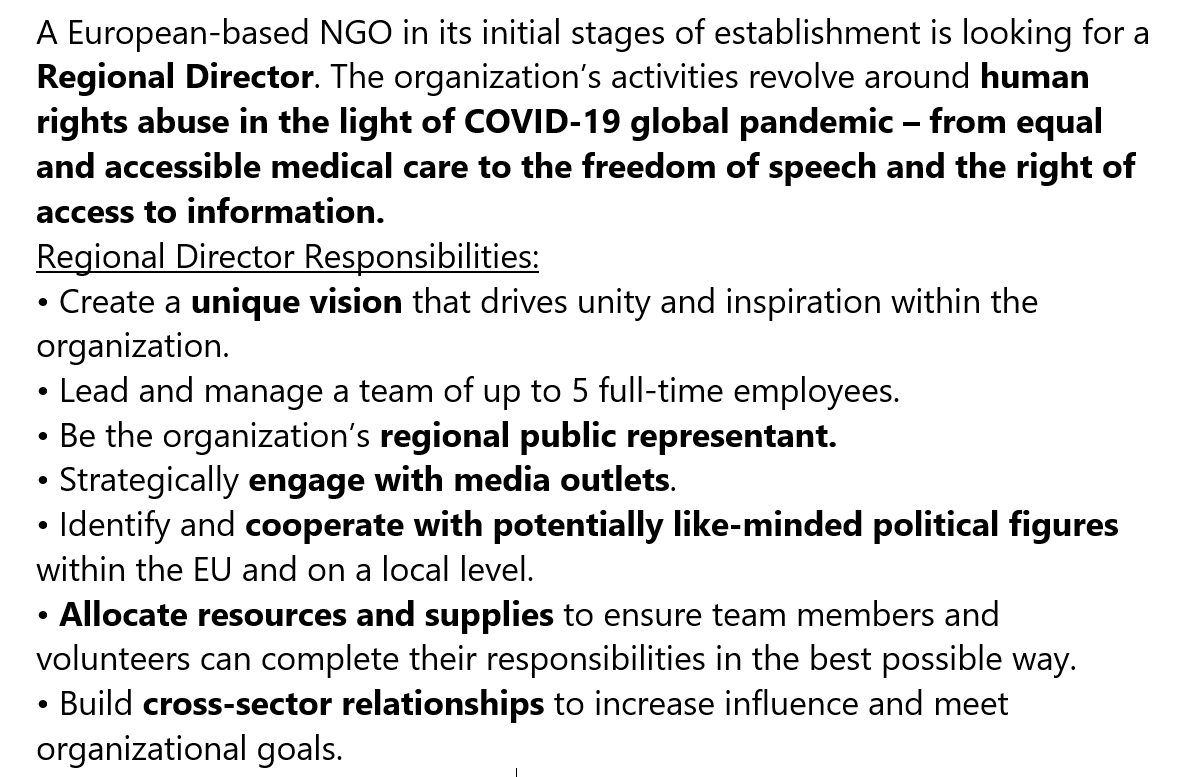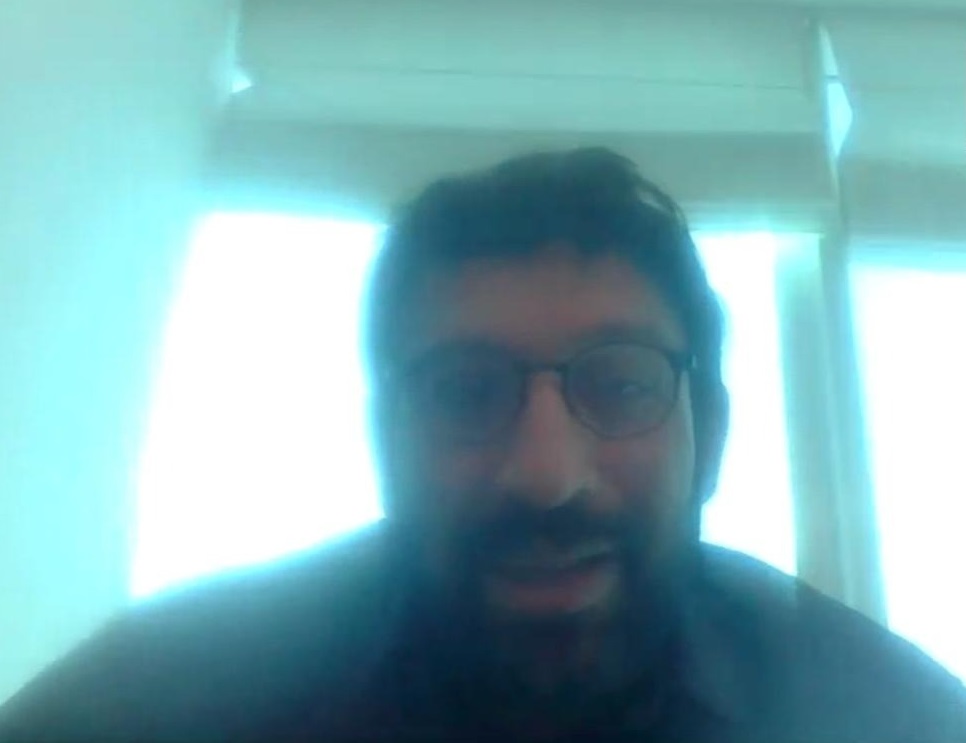The https://english.atlatszo.hu use cookies to track and profile customers such as action tags and pixel tracking on our website to assist our marketing. On our website we use technical, analytical, marketing and preference cookies. These are necessary for our site to work properly and to give us inforamation about how our site is used. See Cookies Policy
Covert intelligence methods used to support PM Orban’s smear campaign against NGOs
Leading pro-government daily newspaper Magyar Nemzet’s online news site has published several video clips presenting them as exposés last week. The paper quotes the words of journalists, experts and political analysts working in the non-profit sector as if they were supporting Fidesz’s conspiracy theories. Among other things, they talk about Brussels’ double standards towards Hungary, the influence of foreign powers on NGOs, the influencing of journalists reporting on Hungary, and the mobilisation of international public opinion against Hungary. The interviewees were approached by persons who were subsequently found to claim fictitious identities, with job offers, requests to write a paper or to give a lecture online. The story is very similar to the “Black Cube” operation before the 2018 elections, when intelligence methods were utilized to discredit NGOs criticised by the Fidesz government.
In our first story on the smear campaign timed to the election campaign, we proved that the video interviews published on Magyar Nemzet Online aimed at discrediting foreign correspondents and NGOs critical of the government were made under suspicious circumstances. Yet they were immediately picked up by the English-language newspaper of the Prime Minister’s Office and shared by government spokesperson Zoltán Kovács on his Twitter page.

Why am I not surprised? Partly because these statements are not the only ones made recently by liberals on the topic of biased reporting about Hungary. I honestly can’t wait to see what’s next. @AmnestyHungary https://t.co/Gmvt5nUHfk
— Zoltan Kovacs (@zoltanspox) February 3, 2022
In the background of the story is an alleged Middle Eastern billionaire, of whom Atlatszo received screenshots from those whom the group conned. They contacted several Hungarian professionals by posting deceptive job advertisements in order to elicit and record statements from them, which, if cleverly presented, could be useful in Fidesz’s election campaign.
The first Magyar Nemzet story quoted a very short, out of context Skype video conversation with Andrej Nosko, who was head of the Governance and Policy Debates Unit of the George Soros-funded Open Society Initiative for Europe until 2018. The article claims that in the video Nosko “practically admitted that there is an untruthful, biased campaign against Hungary and Poland”.
The second Magyar Nemzet story of this series in the newspaper published a video recording with Mátyás Kálmán, a video journalist who previously worked for 24.hu and the Hungarian Civil Liberties Union. The government spokesperson claims that in the Skype interview he said, among other things, that “it is not good that the press is so dependent on NGOs”.
Recruiting interviewers with fake job advertisements
Átlátszó is aware of several professionals active in the nonprofit sector who have fallen for bogus job advertisements placed by people claiming to be philanthropic organisations and individuals, claiming to be looking for staff to support civil society.
One of the victims, who asked to remain anonymous, told us that he was actively looking for a job on LinkedIn and that this is how he came into contact with the video makers. He had applied for a job advertisement looking for someone who, like him, had management experience in the NGO sector. The advertisement was looking for a professional with a degree in finance, marketing, management, political science or international relations, fluent in English, with leadership experience and organisational experience, for a job in Budapest as a regional director for a newly established NGO.
According to the advertisement, they were looking for a specialist to lead a foundation that aims to address human rights abuses during the coronavirus epidemic, promote equal access to health services, freedom of expression and freedom of information. The candidate’s responsibilities included building relationships with the media, identifying and working with like-minded political actors, managing volunteers and staff, and building cross-sectoral relationships.
According to LinkedIn’s counter, more than 100 people applied for the job, including the offended party who spoke to Atlatszo. In the first round, this source spoke to a woman claiming to be an HR manager via video conference, twice. The woman said that a wealthy person wanted to support the creation of an organisation that would then set up other NGOs. According to her LinkedIn profile, the HR manager was of Dutch nationality, and her accent indicated this, our source reported.
She did not say anything about the donor, but promised that the selected candidates would be able to find out more during the last round of interviews. Our contact got suspicious when he had a Skype interview with the alleged billionaire. In the nearly hour-long conversation, the Middle Eastern-looking man had a job interview-style chat with him about his experience setting up and running NGOs. After the conversation, neither the HR manager nor the the alleged billionaire was available again.
Atlatszo has also received screenshots of the alleged billionaire from another person who was also misled by this group. He asked us not to publish this photo, but at first glance it appears that he could have been talking to the same person as the other victim. Our second victim also applied for a job on LinkedIn and was interviewed on a video conferencing platform.
The Magyar Nemzet articles were also reported by Politico. According to the newspaper, in the last two years, in 2020 and 2021, several Hungarian NGO workers were contacted from fake profiles, in a similar way to the Black Cube operation in 2017 and 2018.
After the publication of our first story, multiple people contacted Atlatszo who were also approached by the same group we first introduced, and many of them recognised the pictures. In our second story we described the details of these cases.
Contacted on behalf of a Dutch investor
One professional, who asked not to be named, may have been targeted by the group because of their work dealing with the situation in Hungary at an international NGO. This person recognised the photograph of a woman posing as the staffer of a wealthy philanthropist in our previous article.
This victim was – like many of our other sources – contacted via LinkedIn in September 2021, and received an email with the same text. Our source was told that a foreign entrepreneur was going to invest in Central Europe and that a group of experts from different fields was being set up. Our contact was to give an online presentation on how the political environment in Central Europe affects business. It was planned that the investor would then ask questions.
In September, a Zoom coordination call was arranged with the lady who contacted our source and a woman who presented herself as the coordinator of the planned online event and referred to herself as a “business consultant”. The Zoom conversation, reminiscent of a job interview, took place between our source and the woman named as the event coordinator. The interviewer went through our contact’s publicly available CV, asked questions about the political situation in Hungary, and inquired about previous and current jobs, their operations and activities.
In connection with these, our source was asked several targeted questions, such as “Do you see Hungary getting more attention than other countries?”, “Who is trying to influence Brussels’ policy towards Hungary?”, etc.
During the interview, the victim asked for the identity of the investor, but the interviewer evaded the answer and promised feedback. All she said was that the investor was a Dutch holding company, which also invests in luxury real estate, and that they were looking to open up to V4 countries in the renewable and green energy sectors. About a week after the Zoom conversation, our source received an email from the alleged coordinator saying that he could not give the name of the investor because they had signed a confidentiality agreement. Our source did not reply to this and there were no further messages between them after that.
According to our source the LinkedIn profiles of the two women were done in a way to match the explanation the “coordinator” gave during the conversation about how the two knew each other. Also, the person who did the interview, although her hair colour was different at the time, looked very similar to the photo in our first article, even wearing the same glasses.
The interview of this expert has not yet appeared in the Magyar Nemzet smear campaign.
A social scientist was set up by a fake company
In its third “leaked video” story, Magyar Nemzet quoted Dalibor Rohac, a researcher at the American Enterprise Institute, a US social research institute. Rohac told Átlátszó that he was not talking on Skype with a middle-aged man with a German-sounding accent.
It appears that the Orbán media machine (hello @MagyarNemzetOn) are presenting a bunch of my quotes from ~2020, taken out of context, as “proofs” of “double standard in Brussels” supposedly targeting Hungary. (thread) /1 https://t.co/HJTqh65K48
— Dalibor Roháč (@DaliborRohac) February 7, 2022
At first Rohac couldn’t remember if he had given such a video interview, but then, looking through his email account, he remembered that in July 2020 he had been asked to write a study on rule of law in Hungary, Romania and Bulgaria, by a legitimate-looking consultancy with a website called Wilson Energy Consultants. Since then, the company’s website has been down, and the UK telephone number we tried on the previously live website belongs to Sky television channel’s subscription centre.
Rohac was emailed by a man called ‘Alexander Werner’ from the company, who said he was a ‘managing partner’ at the US firm. Two Skype interviews were conducted with the man. Rohac did not take any screenshots or other recordings, but said that he spoke to a middle-aged, balding, slightly overweight man who looked like a businessman, was well-educated, middle-aged and had a German accent.
In hindsight, what struck him as odd in these conversations was that he asked most about Hungary, “Alexander Werner”, asked several targeted questions and mentioned the phrase “double standards” several times.
Rohac also found it strange that his partner repeatedly asked him to keep his camera on during the interview. During the conversation, a one-page proposal was requested and a further phone call was made later, but then the planned assignment was cancelled by email, citing the pandemic.
“Emma van der Berg” and “Bashar al Hindi” conned former Amnesty director
“I’ve been thinking about this since the morning, I don’t understand it,” Orsolya Jeney, who was also in contact with the group that provided ammunition for the discrediting articles of Magyar Nemzet and the Fidesz campaign, told Átlátszó. Jeney was the director of Amnesty International Hungary until August 2018.
She was sent a job advertisement on LinkedIn in the summer of 2020 by an acquaintance, which she said was roughly the same as the one our sources in our first story interviewed for. She applied for the job of “regional director” after he had asked the recruiter for the position. Here, too, the contact person was a staff woman called “Emma Van der Berg”, as in several of the cases described in our previous article: it was from her that Jeney learned that they were looking for a director in Hungary, but the donor did not want to reveal their identity then.
The details she had learned, the way the staff communicated with her and the whole affair seemed perfectly legitimate and conventional, even though no public information about “Emma Van der Berg” could be found except on her LinkedIn profile.
According to Jeney, the process was conducted in a professional manner and nothing aroused his suspicions. She even found the Skype interview as part of the “pre-screening” process to be perfectly fine, as it was what usually happens in a job interview: she was asked questions about her CV. She was then given a written exercise with specific criteria. She would have liked to receive more details on this, but all she was sent by e-mail was this:
“The NGO’s main objective is to focus on the Eastern European region, as we believe this region is the most vulnerable to governments using COVID 19 as a pretext to increase their power. Our aim is to raise public awareness in the region of such actions by governments and, where possible, to provide assistance to victims of such actions. In our experience, when trying to raise public awareness of a particular issue, volunteers are needed. However, if you think there are other means to achieve this without volunteers, please feel free to express them in writing.”
This was followed by another Skype interview, again with “Emma Van der Berg”, who spoke excellent English and gave the impression of a professional HR manager, both verbally and in writing. Another Skype interview was scheduled for September, this time – with the man we also knew from our first story, who introduced himself as “Bashar al Hindi”, and acted as the donor’s representative.
Jeney found it strange that so little was revealed about the sponsor’s background, but even the interview with al Hindi did not seem suspicious to her, nor did she find it unusual that a wealthy Muslim man living in London would wanted to set up a non-profit in Hungary.
After that, no one contacted Jeney until November 2020, and when she asked Van der Berg about what had happened to the job, she was told that the selection process had been delayed by the political situation in the country. After that, Jeney heard no more about the group, and her interview – for the time being – has not been included in Magyar Nemzet’s smear campaign.
A journalist was also targeted, but he was not fooled
Szabolcs Panyi, investigative journalist at Direkt36, who is known to have been intercepted by the Pegasus spy software, posted on Facebook after our first story:
“A year after my “Pegasusing” ended, in the autumn of 2020, I was also tried with the Black Cube-like ambush setup, which was recently used by Magyar Nemzet news site to produce discrediting materials. The request was extremely lame, I didn’t even reply to it, and then I forgot about the whole thing – until last week, when the materials for the campaign started to be published in the propaganda media.”
Foreign interference in the election campaign?
We asked a legal expert whether this method could constitute foreign interference in an election campaign, if it might be carried out by a foreign secret service or a private intelligence firm.
According to this expert, who asked not to be named, the Hungarian state is not doing enough, to put it mildly, to be transparent about how politics is financed and how voters are influenced in Hungary. Hungarian law only regulates the campaigning and fundraising of political parties (only Hungarian individuals can donate to a party, and party spending in election campaigns is limited by law and made public), but other actors seeking to influence voters can spend as much as they like from sources they like.
“How foreign actors influence Hungarian elections is indeed an important part of this problem, but as long as anyone can freely conduct political campaigns without disclosing their sources, and produce political ammunition even illegally and obviously as paid work, it is obvious that foreign interference within this framework cannot be controlled either.”
We ask readers who recognise the photos of “Emma van der Berg” or “Bashar al Hindi”, or who have otherwise come into contact with them, or who have been similarly conned by others to inform us about these cases.
Written and translated by Gabriella Horn, the original Hungarian language stories are available here and here.
Hungary. What do you know about Hungary? from atlatszo.hu on Vimeo.





